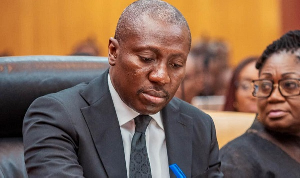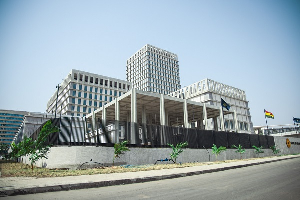In recent years, the Government of Ghana has prioritized the Free Senior High School (SHS) policy, aiming to make secondary education accessible to all Ghanaian children.
While this initiative is commendable, it has inadvertently led to the neglect of the basic education system, which is crucial for the country's educational framework. The negative impacts of this neglect are becoming increasingly evident, raising concerns about the long-term effects on Ghana's education sector and the nation's future.
Resource Allocation Disparities:
The focus on the Free SHS policy has resulted in disproportionate resource allocation, favouring secondary education over primary and Junior High Schools. According to the Ministry of Education's budget allocations, significant portions of the education budget are channelled into the Free SHS program, leaving basic education underfunded. This has led to many basic schools struggling with inadequate infrastructure, teaching materials, and educational programs. In many rural areas, primary schools lack basic amenities such as proper classrooms, libraries, and sanitation facilities. The Ghana Education Service (GES) reports that about 30% of primary schools do not have access to potable water and proper toilet facilities. This creates a challenging learning environment for students, hindering their academic progress and overall development.
In the rural community of Bawku, primary schools operate with limited resources. Teachers often have to use makeshift chalkboards and lack essential teaching aids. This situation contrasts sharply with some urban secondary schools under the Free SHS program, which have received new science laboratories and computer rooms.
Teacher Quality and Training:
The quality of teachers is a critical component of a strong education system. Unfortunately, the basic education sector in Ghana suffers from a shortage of qualified teachers. The National Teaching Council (NTC) has highlighted that many educators in primary and junior high schools lack access to continuous professional development opportunities, essential for enhancing teaching skills and staying updated with modern teaching methods. The neglect of teacher training at the basic level results in poor educational outcomes, as teachers are often ill-equipped to effectively deliver the curriculum and address the diverse learning needs of their students. For instance, a study by the Ghana National Association of Teachers (GNAT) found that 40% of primary school teachers have not participated in any professional development program in the last five years.
In the Northern Region, many primary school teachers report that they have not attended any professional development workshops in years. This neglect of teacher training at the basic level results in poor educational outcomes, as teachers are often ill-equipped to effectively deliver the curriculum and address the diverse learning needs of their students.
Curriculum Implementation Without Resources:
Over the past seven years, the Government of Ghana has introduced new curricula for junior high schools, aiming to improve the quality of education. However, the implementation of these curricula has been plagued by a severe lack of textbooks and other essential learning materials. A survey conducted by the Ghana Education Service in 2022 revealed that only 45% of junior high schools received the required textbooks for the new curriculum, forcing teachers and students to rely on outdated resources or, in some cases, no resources at all. The absence of textbooks hampers effective teaching and learning, as students are unable to engage with the content fully, and teachers struggle to deliver lessons comprehensively.
This situation exacerbates the already-existing challenges in the basic education sector, making it difficult for students to build a strong academic foundation. For instance, in Accra's suburbs, students at a junior high school have been using photocopies of old textbooks because the new books have not been distributed. This lack of proper materials makes it difficult for teachers to cover the curriculum comprehensively, affecting the students' understanding and retention of the material.
Infrastructure Deficiencies:
Infrastructure deficiencies in basic schools are widespread. Many schools operate in dilapidated buildings with limited access to essential facilities such as laboratories, libraries, and even clean water and sanitation. According to a report by UNICEF Ghana, 40% of basic schools lack access to basic sanitation facilities, while 35% do not have access to clean drinking water. While secondary schools under the Free SHS program often receive funding for new buildings and modern facilities, primary schools continue to struggle with overcrowded classrooms and inadequate learning environments.
This imbalance undermines the quality of education provided at the foundational level. For example, a primary school in the Volta Region has classrooms with leaking roofs and broken desks. During the rainy season, classes are often disrupted as students and teachers scramble to avoid the water pouring in. This stark contrast in infrastructure between basic and secondary schools highlights the disparity in attention and investment.
While secondary schools under the Free SHS program often receive funding for new buildings and modern facilities, primary schools continue to struggle with overcrowded classrooms and inadequate learning environments. This imbalance undermines the quality of education provided at the foundational level. In addition to systemic neglect, natural disasters have further exacerbated the challenges faced by basic education. In Mepe, a community in the North Tongu District of the Volta Region, the recent dam spill caused severe flooding, disrupting the lives of many residents, including students. Schools in Mepe were submerged, and educational activities came to a halt. Despite the severity of the situation, the government’s response has been slow, leaving students stranded without a place to continue their education. For instance, Mepe D/A Basic School was completely flooded, destroying classrooms and educational materials. Students and teachers have been displaced, and there are no immediate plans for reconstruction or temporary educational facilities. This lack of concern and immediate action from the government further underscores the neglect of basic education in crisis situations.
Impact on Educational Outcomes:
The neglect of basic education has far-reaching implications for Ghana's educational system and socio-economic development. A weak foundation at the primary and junior high school levels leads to poorly prepared students entering secondary education. This exacerbates the challenges faced by the Free SHS program, as students may struggle to cope with the demands of the secondary curriculum. According to the West African Examination Council (WAEC), the pass rates for the Basic Education Certificate Examination (BECE) have seen a decline over the past five years, indicating a drop in the quality of education at the basic level. This decline in performance at the basic level poses a significant challenge for the Free SHS program, as it receives students who are not adequately prepared for secondary education.
Moreover, focusing on secondary education without addressing foundational issues creates a cyclical problem. Graduates of the Free SHS program may possess secondary education certificates but lack the fundamental skills and knowledge required for higher education or the job market. A study by the National Council for Tertiary Education (NCTE) revealed that 30% of Free SHS graduates struggle with basic literacy and numeracy skills, hindering their progress in higher education and employment opportunities.
Socio-Economic Implications:
The neglect of basic education has broader socio-economic implications for Ghana. Education is a key driver of economic development, and a robust basic education system is essential for creating a skilled and competent workforce. The current imbalance in the education system threatens the country's long-term economic growth and social development. A report by the World Bank highlights that countries with strong basic education systems tend to have higher rates of economic growth and social stability. Investing in primary and junior high schools, improving teacher quality and training, ensuring the availability of textbooks and learning materials, and upgrading infrastructure are essential steps towards a holistic and sustainable educational system.
To conclude, while the Free SHS policy is a significant step towards educational inclusivity, the Government of Ghana must adopt a more balanced approach. Addressing the needs of the basic education sector is crucial for creating a strong educational foundation that supports the overall success of the Free SHS program and the country's development goals. Investing in primary and junior high schools, improving teacher quality and training, ensuring the availability of textbooks and learning materials, and upgrading infrastructure are essential steps towards a holistic and sustainable educational system. By doing so, Ghana can ensure that every child receives a quality education from the ground up, paving the way for a brighter future for the nation.
Opinions of Monday, 8 July 2024
Columnist: Mileba Godwin Kwame



















